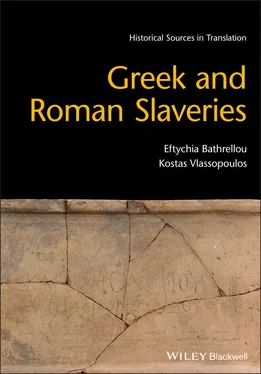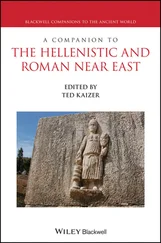1 ...6 7 8 10 11 12 ...19 Bitinna: I’ll let you off the hook now. And be grateful to this girl here, whom I cherish no less than Batyllis, as I reared her in my own arms. But when we have poured our honeyless libations to the dead, you will then celebrate a second “honeyless” festival.
What is the relationship between Gastron and Bitinna? Why does Bitinna want to punish Gastron?
How does Gastron attempt to avoid punishment?
How does Kydilla try to get Gastron off the hook? What does her strategy tell us about master–slave relations?
How are relationships among slaves depicted in this passage?
What is the relationship between Kydilla and Bitinna? How do both sides use their relationship to present their arguments and achieve their aims?
To which genre does the passage belong? What is the point of presenting a mistress that has sexual relationships with her slave?
Can we use this passage to understand slavery as an asymmetrical negotiation between masters and slaves?
1.20 Galen, How to Detect Malingerers (Quomodo simulantes morbus deprehendi ), pp. 114,14–115,14 Deighgräber and Kudlien 22(XIX.4–5 Kühn): Greek Medical Treatise (Late Second/Early Third Century CE)
Literature: Schlange-Schöningen 2003: 255–90, 2006.
I must now recall what has already been said, namely that experience together with resourcefulness can detect those who make false claims, including those who pretend to be suffering from severe pain. When another man claimed that he had extremely severe pain in his knee – this man was a slave, one of these who run beside their master in his journeys – I noticed that his pain was a sham. What made me suspicious was both the fact that his master would set out that day and the character of the lad; he was the kind who are capable of shamming in such things. I also asked one of his fellow-slaves who disliked him whether the lad had a liaison with some woman, which would naturally make him wish to stay put when the master set off on a longer journey, into the country, away from home. And this was indeed the case. These things I found out using common resourcefulness. However, there was a huge swelling on the lad’s knee, who would astound a lay man but would be obvious to one with specialist experience as caused by thapsia. 23This is the result of medical experience, not something that a layperson can resolve with his resourcefulness. Another result of medical experience was the discovery that the lad had not previously suffered or done anything that was capable of suddenly causing such a swelling. For he had not run more than normal, nor had he been wounded by someone else, nor had he got hurt by leaping over a ditch. Moreover, there were no signs of blood excess in his body, nor had his earlier regimen included excessive consumption of food and drink or a sedentary lifestyle. On top, when we asked him what type of pain he felt, he was slow to respond, did not give a straight answer and contradicted himself. So, when his master went out, I put a drag on his knee, which does not at all extinguish pain but is capable of cooling the heat produced by thapsia. After one hour, I had him admitting that he felt no pain at all.
What is the job of the malingering slave? Are you surprised that the master calls a famous doctor like Galen for such a slave?
Why does Galen suspect that the slave is lying?
What does he suspect the reason to be?
How does he try to find out the truth? Does he ask the master?
What can we learn about slave life and relations among slaves from this passage?
Are the slaves mere instruments for the purposes of their masters?
How does acknowledging slave agency change our understanding of slavery?
1.21 Galen, The Doctrines of Hippocrates and Plato (De placitis Hippocratis et Platonis), V.7.64–66, pp. 352,20–354,2 De Lacy 24(V.497–98 Kühn): Greek Medical Treatise (Late Second/Early Third Century CE)
Galen is here commenting on Plato, Republic , 440c1–d3, which illustrates via an example that the spirited part of the soul is an ally of the rational part of the soul. The Platonic example consists of the opposing reactions of two men to harsh treatment: one of them believes that he is in the wrong, while the other believes that he is being wronged.
Literature: Schlange-Schöningen 2003: 255–90, 2006.
The man who thinks that he is suffering justly, because he himself committed some wrong first, endures his punishment all the more nobly the nobler he is by nature. The other man, who thinks that he is being wronged, gets angry, rages and fights on the side of what seems to him to be just. We can observe these things happening every day among our slaves, too. Those who are caught thieving or doing things of that sort do not get angry when they are being whipped or starved or dishonored by their masters. But those who think that they suffer, or have suffered, such punishments wrongly, their spirit always turns savage inside them and craves vengeance on the one who is wronging them.
Which forms of punishment for slaves are presented in the passage?
What criterion determines whether slaves accept punishment or not, according to Galen? Do you believe Galen?
How might the principle of just punishment have affected the unilateral right of masters to punish their slaves?
1.22 Aulus Gellius, Attic Nights , 1.26.3–9: Latin Miscellany of Learned Material (Second Century CE)
Aulus Gellius here reports part of the answer given to him by Lucius Calvinus Taurus, a contemporary Platonist philosopher, when he asked him whether wise men ever got angry. Plutarch, another Platonist, was an influential philosopher and biographer.
Literature: Harris 2001: 317–36; Klees 2005; Hunt 2016; Lenski 2016.
“This is what I think,” Taurus said, “about getting angry. But it would do no harm to hear, also, what our Plutarch, an extremely learned and wise man, thought. Plutarch,” he said, “once gave orders that a slave of his, a worthless and insolent fellow but with ears filled with philosophical works and arguments, be stripped of his tunic for I don’t know what offence, and whipped. The beating had started, and he kept protesting that he had not done anything deserving flogging – he had not been guilty of anything wrong or criminal. In the end, amid the flogging, he began to shout – no longer making complaints, groans, and laments but serious and reproachful arguments: that Plutarch’s behavior was improper for a philosopher; that it was shameful to get angry; that Plutarch had often lectured on the evil of anger and had even written a very fine book On Lack of Anger , and that it was not compatible with anything of what was written in the book that he, submitting and yielding to anger, punished him with many blows.
“Then Plutarch spoke, calmly and mildly. ‘Oh you who deserve to be under the whip, do I now seem angry to you? Is it from my face, or from my voice, or my complexion or, even, from my words that you perceive I’ve been seized by anger? I think that neither my eyes are fierce, nor is my face wild, nor am I shouting uncontrollably, nor am I raging to the point of foaming around the mouth or turning red, nor am I saying words to be ashamed of or regret, nor am I trembling or gesticulating because of anger. For, in case you don’t know it, all these things are the typical signs of anger.’ And, turning at the same time toward the one who was whipping the slave, he said: ‘Meanwhile, while this fellow and I are arguing, you continue your task.’”
How does the slave initially attempt to avoid punishment? How does this relate to 1.21?
What is the second argument that he uses? Does it work?
Читать дальше












